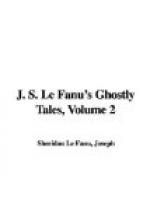“And why do you talk of sleeping no more with me?” said Alice.
“Why? Alice dear—no why—no reason—only a knowledge that it must be so, or Una will die.”
“Die, Una darling!—what can you mean?”
“Yes, sweet Alice, die, indeed. We must all die some time, you know, or—or undergo a change; and my time is near—very near—unless I sleep apart from you.”
“Indeed, Una, sweetheart, I think you are ill, but not near death.”
“Una knows what you think, wise Alice—but she’s not mad—on the contrary, she’s wiser than other folks.”
“She’s sadder and stranger too,” said Alice, tenderly.
“Knowledge is sorrow,” answered Una, and she looked across the room through her golden hair which she was combing—and through the window, beyond which lay the tops of the great trees, and the still foliage of the glen in the misty moonlight.
“’Tis enough, Alice dear; it must be so. The bed must move hence, or Una’s bed will be low enough ere long. See, it shan’t be far though, only into that small room.”
She pointed to an inner room or closet opening from that in which they lay. The walls of the building were hugely thick, and there were double doors of oak between the chambers, and Alice thought, with a sigh, how completely separated they were going to be.
However she offered no opposition. The change was made, and the girls for the first time since childhood lay in separate chambers. A few nights afterwards Alice awoke late in the night from a dreadful dream, in which the sinister figure which she and her father had encountered in their ramble round the castle walls, bore a principal part.
When she awoke there were still in her ears the sounds which had mingled in her dream. They were the notes of a deep, ringing, bass voice rising from the glen beneath the castle walls—something between humming and singing—listlessly unequal and intermittent, like the melody of a man whiling away the hours over his work. While she was wondering at this unwonted minstrelsy, there came a silence, and—could she believe her ears?—it certainly was Una’s clear low contralto—softly singing a bar or two from the window. Then once more silence—and then again the strange manly voice, faintly chaunting from the leafy abyss.
With a strange wild feeling of suspicion and terror, Alice glided to the window. The moon who sees so many things, and keeps all secrets, with her cold impenetrable smile, was high in the sky. But Alice saw the red flicker of a candle from Una’s window, and, she thought, the shadow of her head against the deep side wall of its recess. Then this was gone, and there were no more sights or sounds that night.
As they sate at breakfast, the small birds were singing merrily from among the sun-tipped foliage.
“I love this music,” said Alice, unusually pale and sad; “it comes with the pleasant light of morning. I remember, Una, when you used to sing, like those gay birds, in the fresh beams of the morning; that was in the old time, when Una kept no secret from poor Alice.”




